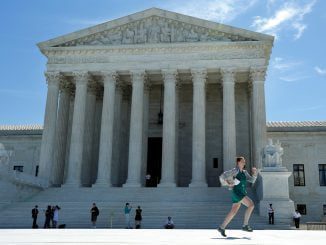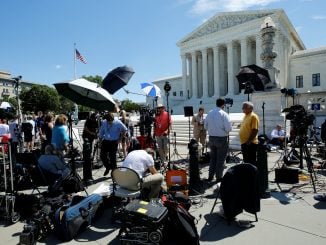RALEIGH — North Carolina and Virginia Republican Lt. Govs. Mark Robinson and Winsome Sears have filed an amicus brief in the college admissions discrimination case being heard by the U.S. Supreme Court.
Robinson and Sears, who are both the first black lieutenant governors in their respective states, filed a joint amicus curiae brief in support of Asian students on May 9.
In a press statement announcing the amicus filing, Sears said “It is time to end the policies of college selection based on race, which is counter to equal treatment under the law.”
“University-sponsored and supported charter schools, the expansion of scholarships for low-income students, and improved student testing methods will help provide increased diversity at universities,” Sears said. “The right to a good education doesn’t come at the expense of denying another the right as well. We learn from history that we don’t learn from history. We are not about to deny educational rights to Asian children. Rather, we must ensure that all children have access to educational opportunities.”
Also on May 9, Gail Heriot and Peter N. Kirsanow, two members of the U.S. Civil Rights Commission, also filed an amicus curiae brief in support of SFFA. Heriot is a law professor and Kirsanow is a practicing attorney and adjunct law professor. To date, some 30 amicus briefs in support of SFFA’s case have been filed.
On May 19, the NC Asian American Coalition (NCAAC) held an event at Robinson’s office in Raleigh to thank him for his support. Among the three or so dozen in attendance were civil rights icon Clarence Henderson, Color Us United’s Kenny Xu, and attorney Tyler Brooks, who helped author the joint amicus brief.
NCAAC is a 501(c)4, non-religious and non-partisan nonprofit organization that “focuses on policy advocacy, leadership development, and grassroots education interests” for the Asian American community in North Carolina.
In an interview with North State Journal, Brooks said the point of the brief was to support the goal of the petitioners, Students For Fair Admissions (SFFA), that “the law should not engage in what Chief Justice Roberts has called ‘the sordid business of divvying us up by race’.”
“The point here is to move away from those policies,” Brooks said of the brief’s intent to address discrimination in academic admissions policies.
Robinson was the last to speak at the event, saying “It is time to ensure that all the students in our state and nation have the same access to higher education, regardless of their race or ethnicity.”
In this age, our nation desperately needs our best and brightest to be our most highly-educated and prepared to meet the challenges of a dynamic global economy. Our international competitors in China and around the world aren’t having the economic success they are because they prioritize diversity and equity and inclusion,” Robinson said in his prepared remarks. “They are rivaling the American economy because their priority is that their very best and brightest students are empowered to do great things and afforded the very best educational opportunities available.”
The original cases against Harvard University and the University of North Carolina at Chapel Hill (UNC) were brought by SFFA. The cases against both schools were filed in 2014. SFFA lost both cases and appealed to the U.S. Supreme Court, which accepted and consolidated the cases on Jan. 24, 2022.
At the heart of SFFA’s case is the Supreme Court’s previous 2003 ruling in Grutter v. Bollinger, which said that the Equal Protection Clause of the Fourteenth Amendment did not prohibit “narrowly tailored use of race in admissions decisions to further a compelling interest in obtaining the education benefits that flow from a diverse student body.”
During his remarks, Robinson also called attention to Grutter v. Bollinger’s impending expiration.
“Well, we are coming up on the 20th year since that decision, and we can now plainly see that the negative effects of racial preferences outweigh any good they can do in 2022,” Robinson said.
Robinson continued, “While it can be argued that these policies had a role in helping black Americans to overcome the persistent effects of historical and past discrimination in higher education, those effects are becoming less impactful the further we as a people travel from the dark days of Jim Crow and state-sanctioned discrimination.”
Both the Heriot/Kirsanow amicus and Robinson/Sears briefs take aim at the constitutionality Grutter. Both briefs argue the ruling violates the Equal Protection Clause and Title VI of the Civil Rights Act of 1964.
“Grutter should be overturned because it permits public and private universities like those in these cases to violate the Equal Protection Clause and Title VI of the Civil Rights Act of 1964 by discriminating on the basis of race,” the brief reads. “Grutter was a dangerous decision—so dangerous the Court said at the time it was issued that its holding should have a lifespan of no more than twenty-five years.”
The brief goes on to ask Grutter should “nonetheless be discarded now in favor of race neutral and truly effective means of enhancing educational opportunities for all students.”
“Such a course would not only improve education, but also remove the judicial reinforcement for a toxic ideology that is increasingly dividing American society based on race. Grutter must be repudiated by this Court,” states the brief.



